Abstract
The fact that consumers have problems in utilizing their formal power as board members is usually attributed to individual deficiencies or cultural differences. The position argued here is that such views need to be questioned and amended. Thus, the ties between a health center and the larger health care system, the relations of consumers to their community environments, and the internal organization of health centers are examined as structural factors which limit the effectiveness of consumer board members.Despite the magnitude and durability of such factors, suggestions are made for increasing the effectiveness of consumer-based boards.
Full text
PDF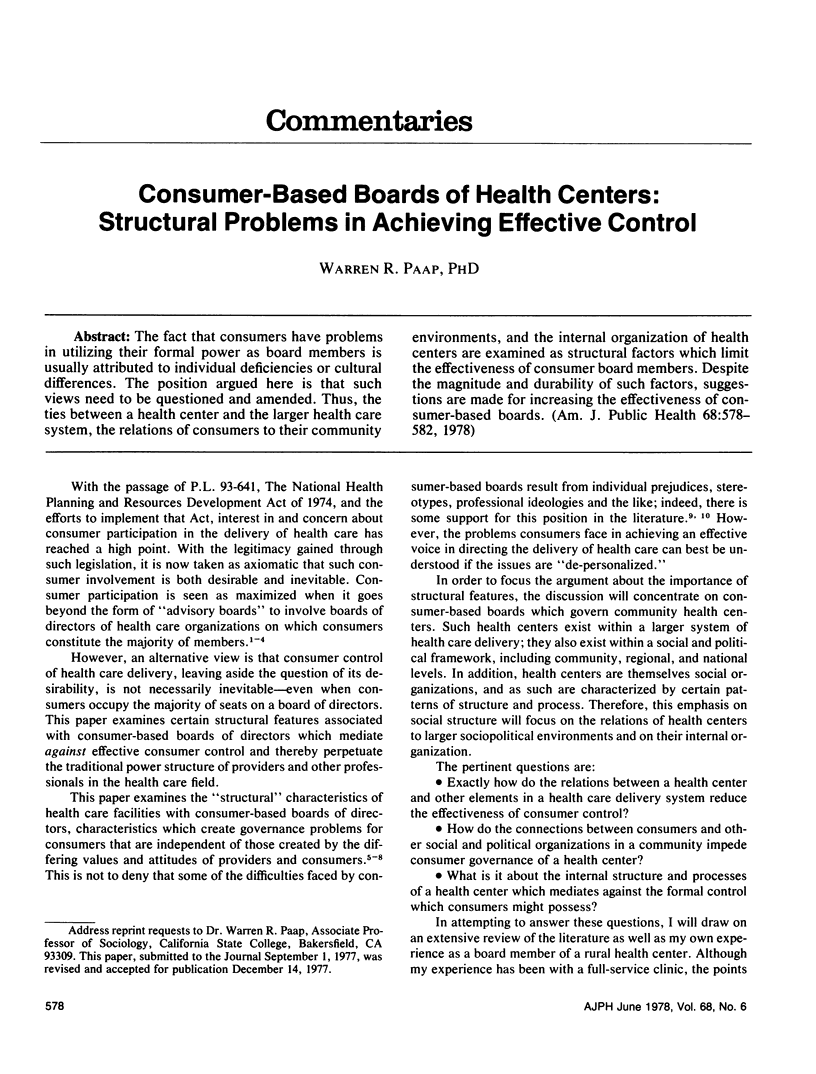
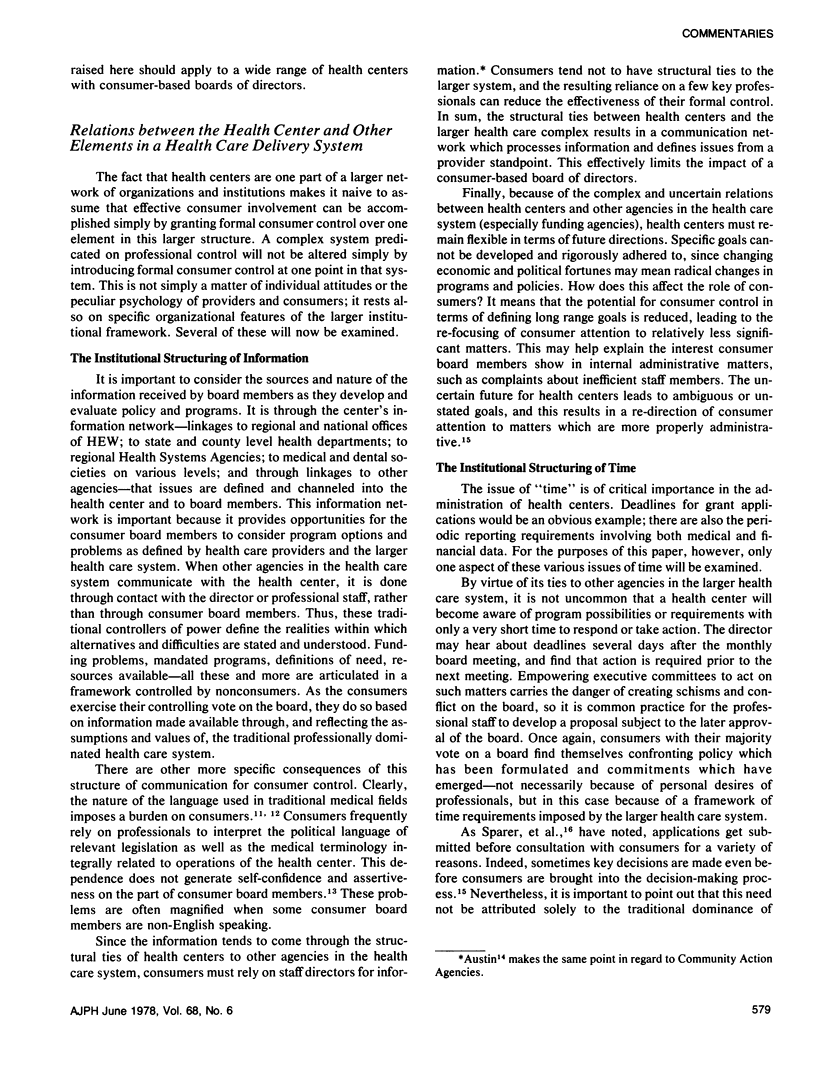
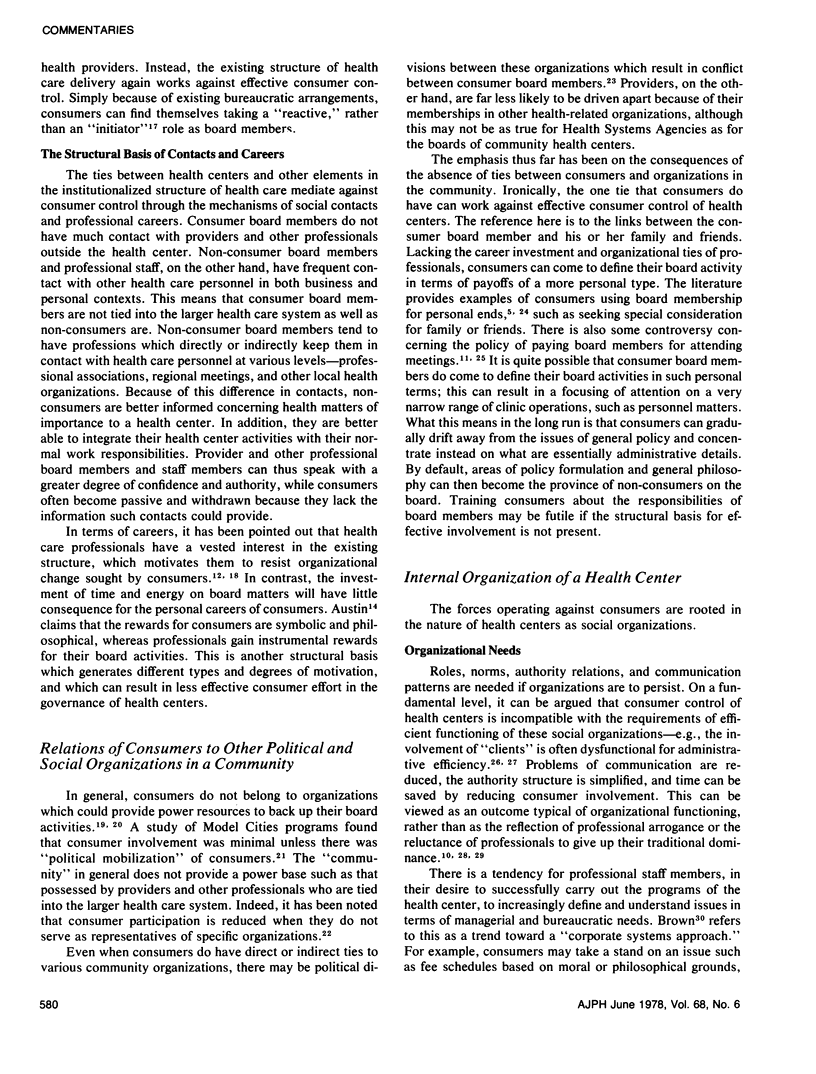
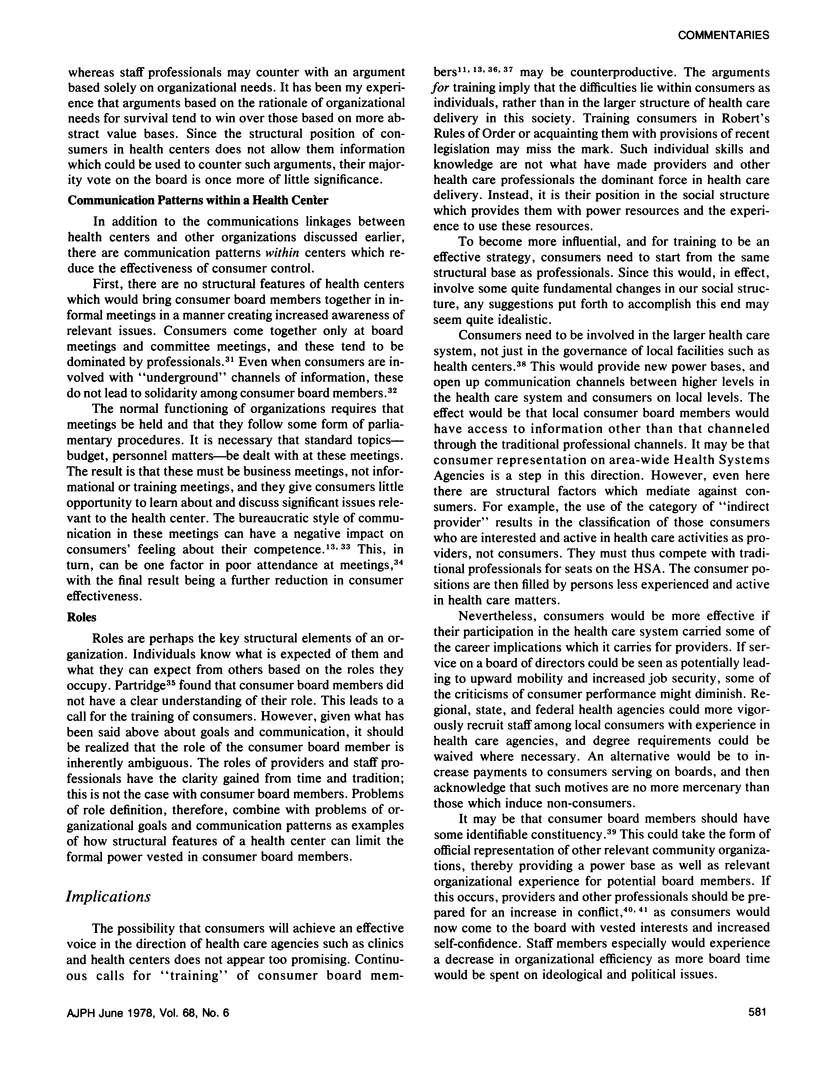
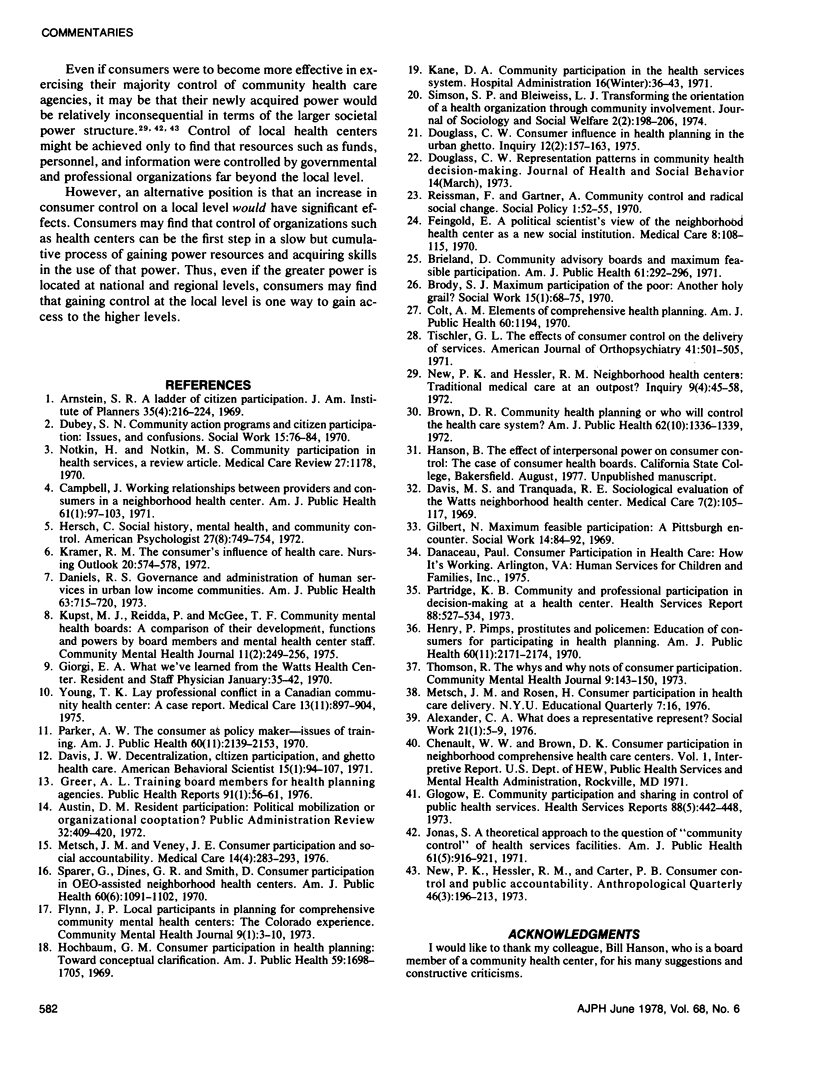
Selected References
These references are in PubMed. This may not be the complete list of references from this article.
- Brieland D. Community advisory boards and maximum feasible participation. Am J Public Health. 1971 Feb;61(2):292–296. doi: 10.2105/ajph.61.2.292. [DOI] [PMC free article] [PubMed] [Google Scholar]
- Brown D. R. Community health planning or who will control the health care system. Am J Public Health. 1972 Oct;62(10):1336–1339. doi: 10.2105/ajph.62.10.1336. [DOI] [PMC free article] [PubMed] [Google Scholar]
- Campbell J. Working relationships between providers and consumers in a neighborhood health center. Am J Public Health. 1971 Jan;61(1):97–103. doi: 10.2105/ajph.61.1.97. [DOI] [PMC free article] [PubMed] [Google Scholar]
- Colt A. M. Elements of comprehensive health planning. Am J Public Health Nations Health. 1970 Jul;60(7):1194–1204. doi: 10.2105/ajph.60.7.1194. [DOI] [PMC free article] [PubMed] [Google Scholar]
- Daniels R. S. Governance and administration of human services in urban low-income communities. Am J Public Health. 1973 Aug;63(8):715–720. doi: 10.2105/ajph.63.8.715. [DOI] [PMC free article] [PubMed] [Google Scholar]
- Davis M. S., Tranquada R. E. A sociological evaluation of the Watts neighborhood health center. Med Care. 1969 Mar-Apr;7(2):105–117. doi: 10.1097/00005650-196903000-00004. [DOI] [PubMed] [Google Scholar]
- Douglass C. W. Consumer influence in health planning in the urban ghetto. Inquiry. 1975 Jun;12(2):157–163. [PubMed] [Google Scholar]
- Feingold E. A political scientist's view of the neighborhood health center as a new social institution. Med Care. 1970 Mar-Apr;8(2):108–115. doi: 10.1097/00005650-197008020-00005. [DOI] [PubMed] [Google Scholar]
- Flynn J. P. Local participants in planning for comprehensive community mental health centers: The Colorado experience. Community Ment Health J. 1973 Spring;9(1):3–10. doi: 10.1007/BF01441426. [DOI] [PubMed] [Google Scholar]
- Glogow E. Community participation and sharing in control of public health services. Health Serv Rep. 1973 May;88(5):442–448. [PMC free article] [PubMed] [Google Scholar]
- Henry P. Pimps, prostitutes, and policemen: education of consumers for participating in health planning. Am J Public Health Nations Health. 1970 Nov;60(11):2171–2174. doi: 10.2105/ajph.60.11.2171. [DOI] [PMC free article] [PubMed] [Google Scholar]
- Hersch C. Social history, mental health, and community control. Am Psychol. 1972 Aug;27(8):749–754. doi: 10.1037/h0033220. [DOI] [PubMed] [Google Scholar]
- Hochbaum G. M. Consumer participation in health planning: toward conceptual clarification. Am J Public Health Nations Health. 1969 Sep;59(9):1698–1705. doi: 10.2105/ajph.59.9.1698. [DOI] [PMC free article] [PubMed] [Google Scholar]
- Jonas S. A theoretical approach to the question of "community control" of health services facilities. Am J Public Health. 1971 May;61(5):916–921. doi: 10.2105/ajph.61.5.916. [DOI] [PMC free article] [PubMed] [Google Scholar]
- Kramer M. The consumer's influence on health care. Nurs Outlook. 1972 Sep;20(9):574–578. [PubMed] [Google Scholar]
- Kupst M. J., Reidda P., McGee T. F. Community mental health boards: a comparison of their development, functions, and powers by board members and mental health center staff. Community Ment Health J. 1975 Fall;11(3):249–256. doi: 10.1007/BF01424804. [DOI] [PubMed] [Google Scholar]
- Metsch J. M., Veney J. E. Consumer participation and social accountability. Med Care. 1976 Apr;14(4):283–293. doi: 10.1097/00005650-197604000-00001. [DOI] [PubMed] [Google Scholar]
- New P. K., Hessler R. M. Neighborhood health centers: traditional medical care at an outpost? Inquiry. 1972 Dec;9(4):45–58. [PubMed] [Google Scholar]
- Parker A. W. The consumer as policy-maker--issues of training. Am J Public Health Nations Health. 1970 Nov;60(11):2139–2153. doi: 10.2105/ajph.60.11.2139. [DOI] [PMC free article] [PubMed] [Google Scholar]
- Partridge K. B. Community and professional participation in decision making at a health center. Health Serv Rep. 1973 Jun-Jul;88(6):527–534. [PMC free article] [PubMed] [Google Scholar]
- Sparer G., Dines G. B., Smth D. Consumer participation in OEO-assisted neighborhood health centers. Am J Public Health Nations Health. 1970 Jun;60(6):1091–1102. doi: 10.2105/ajph.60.6.1091. [DOI] [PMC free article] [PubMed] [Google Scholar]
- Thomson R. The whys and why nots of consumer participation. Community Ment Health J. 1973 Summer;9(2):143–150. doi: 10.1007/BF01411090. [DOI] [PubMed] [Google Scholar]
- Tischler G. L. The effects of consumer control on the delivery of services. Am J Orthopsychiatry. 1971 Apr;41(3):501–505. doi: 10.1111/j.1939-0025.1971.tb01136.x. [DOI] [PubMed] [Google Scholar]
- Young T. K. Lay-professional conflict in a Canadian community health center: a case report. Med Care. 1975 Nov;13(11):897–904. doi: 10.1097/00005650-197511000-00002. [DOI] [PubMed] [Google Scholar]


